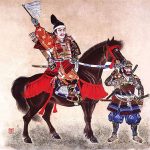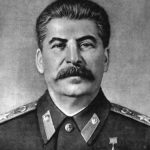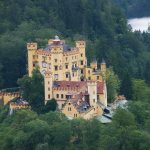Charles V (Carlos Quinto) was King of Spain (1516 – 1556) and Holy Roman Emperor (qv. 1519 – 1556). He was the son of Philip I (el Hermoso) and Joanna of Spain, and grandson of Maximilian I. Charles ascended the throne of Spain in 1516, and quickly united it with the Holy Roman Empire when he inherited that as well, in 1519.
It is said that he found himself weighed down by responsibilities in both spheres, and was thus never really able to pay enough attention to national (Spanish) and international (H.R.E) problems. Nonetheless, he achieved a great deal on both fronts.
In Spain, he was instantly faced by the usual revolt, and on the strength of his resolve in such matters he laid the foundations of firm government which guaranteed Spanish greatness for a hundred years after his death. Meanwhile, in Italy his policies overcame papal resistance to the establishment of Spanish rule. Again, in France his long battle with Francois I could not be called decisive, but it did weaken France to the extent that she was unable to threaten Spain until the opening shots of the Thirty Years War.
Charles V also began the Spanish tradition of opposition to the Ottoman Empire which always remained a threat to Christian Europe. He was not at all popular in the Netherlands (now Belgium and Holland) where he maintained an iron grip. He failed utterly, however, in Germany, where he was quite unable to check the growth (to him heretical) of Protestantism, or properly control the German princes or nobility (who could?).
Exhausted by 1555/56, he passed Spain over to his son Philip, and the Holy Roman Empire to his brother Fernando. Having done this, he retired to the peace and quiet of a monastery, where he died.
John (Don Juan de Austria 1545 – 78) was both soldier and admiral, in the true tradition of Spain. He was an illegitimate son of the Emperor Charles V (see above), educated and brought up in Spain, and recognised (as half-brother) by Philip (Felipe II). No sluggard, formidable and most intelligent, Juan was appointed overall commander of the Spanish Navy in 1568 at the age of twenty-three. He orchestrated the suppression of The Revolt of the Moriscos (Moors, 1569 – 70).
Don Juan’s most important act was commanding the fleet of the Holy League fleet at the famous sea battle (against the Turks) of Lepanto in 1571. He did not know it, but one of the condemned oarsmen in one of the galleys was none other than Miguel Cervantes, later to become legendary as the writer of the first novel in universal literature (Don Quixote).
Later, in 1573 Don Juan invaded and held Tunis. Sadly, his brilliant military and naval career began to founder after he was appointed to the Netherlands as Governor-General, in 1576 at the age of twenty-nine. It was a crucial moment in the Dutch rebellion against Spanish rule. Don Juan was young, impatient and incapable of negotiation, which he considered dull and boring. This led to the resumption of even more violent hostilities in 1577.
Perhaps also because he was a handsome (and ambitious) young man, he planned to marry Mary, Queen of Scots (an idea which appealed to this French and Scottish lady), but John also had it in mind to use this marriage to remove Queen Elizabeth I (qv.) from the throne of England. This was not a good idea at all, as that lady had no intention of being removed or replaced by anyone, not even a hard young adventurer from Spain. Luckily (for him, but perhaps not Europe), Don Juan of Austria died of typhus before he could expedite these plans. He was thirty-three years old.









Leave A Comment